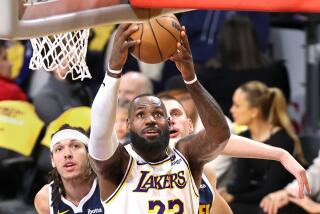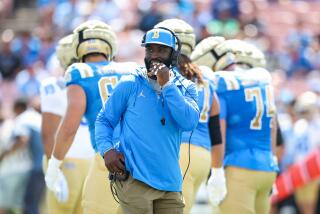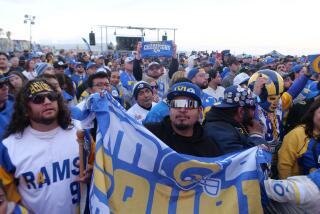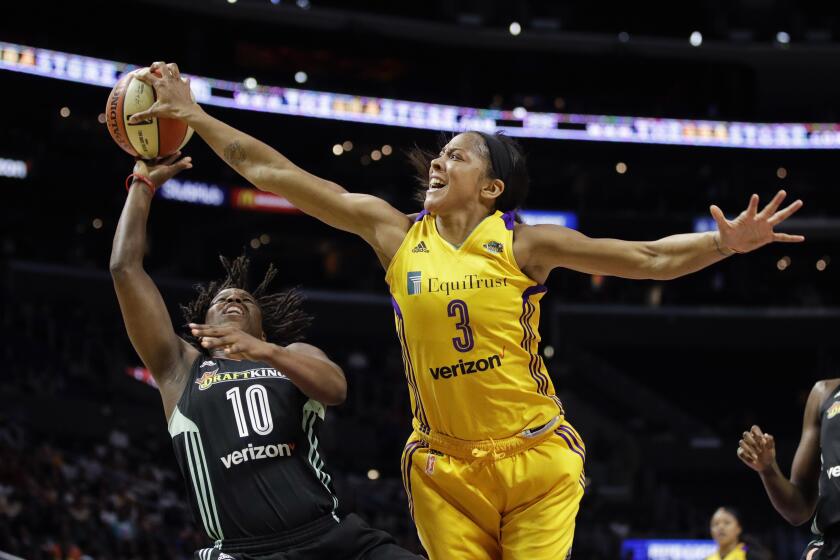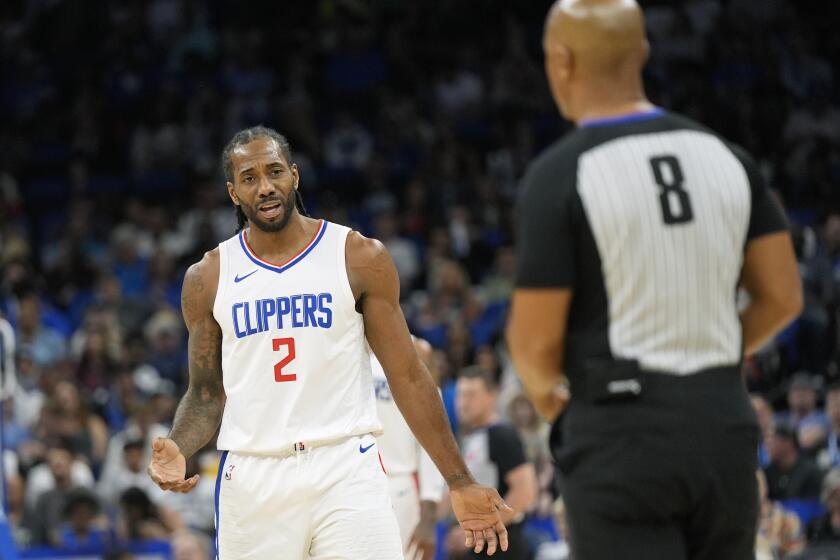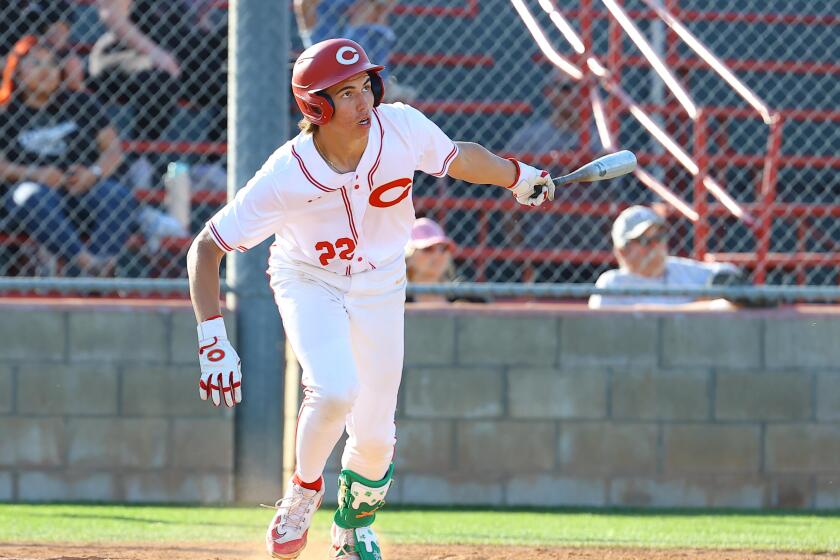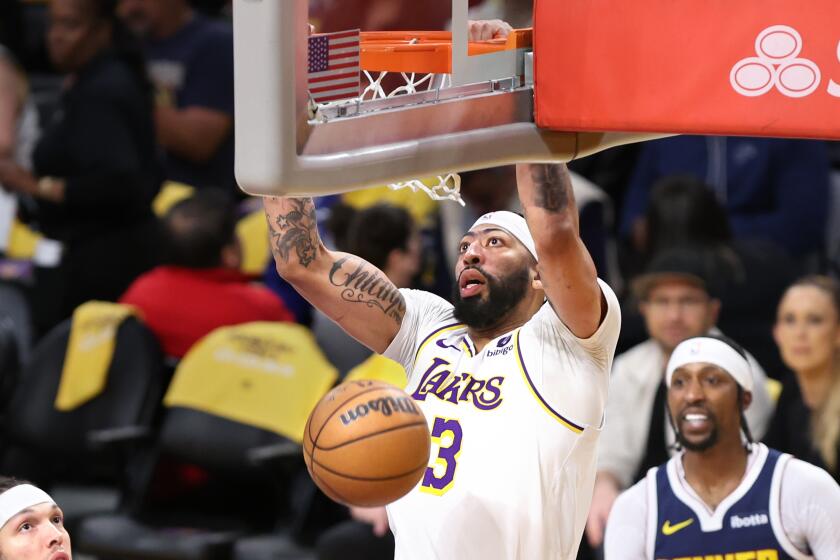Baseball seeks the Yao factor
BEIJING -- How do you explain inning in Chinese?
That is among the challenges facing the Dodgers as they prepare to play the San Diego Padres in the first major league games in China. It is with a certain missionary zeal that the teams hope to enlighten China’s 1.3 billion people in the pleasures of the exotic sport of bang qiu, literally “stick ball.”
American sports have a mixed track record in China. The Chinese are crazy about basketball. The smiling face of Yao Ming, the 7-foot-6 Chinese player with the NBA’s Houston Rockets, stares out of more posters in present-day Beijing than that of Mao Tse-tung. But the NFL has floundered in its efforts to organize a preseason game on Chinese soil. While baseball paraphernalia, mostly counterfeit New York Yankees caps and T-shirts, is as common as fake Louis Vuitton bags, the game itself remains an enigma to most Chinese people.
“Explaining the rules is hard enough in the USA to people who are new,” Dodgers Manager Joe Torre said at a news conference here Thursday. “You have to be able to witness the game.”
Toward that end, the exhibition games will be held March 15 and 16 at the 12,000-seat Wukesong Stadium, which is being built for the 2008 Summer Olympics here.
The games are part of a concerted push by Major League Baseball to crack the Chinese market. MLB opened an office in Beijing last summer and simultaneously launched a program to train Chinese coaches who in turn will teach up to 100,000 Chinese youths.
The idea is to nurture a future Yao, somebody whose star power can sell baseball to the Chinese.
“You don’t have to be very tall to play this game of baseball. There is a place on the field for a person of every physical stature,” Torre said. He pointed to the guest sitting next to him, Dave Winfield, the 6-foot-6 Hall of Famer and former Padres outfielder, and added, “Although if we had a choice we’d all like to be built like him, you don’t have to be.”
Gene Orza, chief operating officer of the MLB Players Assn., was more blunt on the subject of Asian physique.
“We’ve got to tell these children, ‘You’re not going to grow to be a basketball player. You’re too short. Try baseball,’ ” he said.
“Chinese people love ballet. You’ll see a lot of ballet in baseball. Chinese people love intricacy. You’ll see a lot of intricacy in baseball. I think the sport blends very nicely with the things that the Chinese love and treasure in their culture.”
Americans have been trying to sell the Chinese on the beauty of baseball for decades. In 1986, former Dodgers owner Peter O’Malley oversaw the building of a baseball stadium in the coastal city of Tianjin, 75 miles southeast of Beijing. Former Dodger Jim Lefebvre was sent to China in 2003 to manage the Chinese national team, which enjoyed its first success in 2005, beating South Korea at the Asian qualifier for the World Cup of Baseball in Japan.
But the Chinese Baseball League, which was established in 2003, has had a slow start. The original American promoter pulled out, turning the league over to a Japanese company. The six teams in the league routinely play in empty stadiums.
“Baseball is a tough sell here,” said Zhou Zuyi, a sportswriter from Shanghai, who says he has covered many games from empty stands. “Imagine nobody watching while the best of China’s players are out there. . . . People in this country just don’t have an understanding of baseball.”
Baseball has been more successful in Japan, South Korea and Taiwan, all of which have sent players to the major leagues. But the situation has been complicated in China by an unfortunate stigma it acquired as a counterrevolutionary sport.
The first baseball games on Chinese soil were played in the 19th century by students returning from American universities. Missionaries also helped to organize teams. Later, the Communists turned against baseball. While soldiers in the Peoples’ Liberation Army were encouraged to play basketball for exercise, baseball was banned entirely when the Cultural Revolution started in the 1960s. Mao himself is said to have derided it as an “evil Western influence.”
“I hate to speak of the dead,” said Orza, “But I would have to say that Mao just didn’t know any better.”
--
More to Read
Get our high school sports newsletter
Prep Rally is devoted to the SoCal high school sports experience, bringing you scores, stories and a behind-the-scenes look at what makes prep sports so popular.
You may occasionally receive promotional content from the Los Angeles Times.
